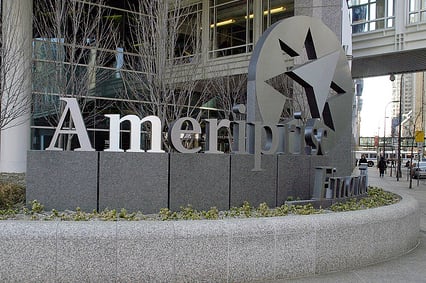Acquisition by company's subsidiary gives financial industry giant entrée into the market for active offerings
Columbia Management Investment Advisers, LLC, a subsidiary of Ameriprise Financial Inc, has agreed to purchase Grail Advisors LLC, a move that will likely transform the firm into a major player in the exchange-traded fund industry, experts said.
As first reported on InvestmentNews.com yesterday, Ameriprise had been in talks with Grail and a deal had been imminent.
Grail first disclosed news of a potential sale in a Jan. 5 filing with the Securities and Exchange Commission.
a href=http://www.investmentnews.com/article/20110106/FREE/110109932>In a Jan. 6 interview with InvestmentNews, William M. Thomas, Grail's chief executive said that the provider of active ETFs was in talks with a “well-known firm in the money management space that is just as excited about the active ETF space as we are.” He declined to identify the firm but said that it wasn't a firm that does business with Grail.
“This jump starts our entrance into active ETFs,” Colin Moore, chief investment officer of Columbia Management, said in a statement announcing the deal. “It will enhance our already deep product line-up and allow us to reach even more investors with our broad investment management capabilities. We intend to utilize this acquisition to build an extensive offering of actively managed ETFs over time.”
In 2009, Ameriprise bought Columbia Management Group from Bank of America Inc. for $1 billion.
By purchasing Grail, Columbia will automatically have exemptive relief from the SEC to launch actively managed ETFs, which can often take months, if not years to get.
There is about $4 billion invested in active ETFs, according to Morningstar Inc.
This means that Columbia could come out with ETF versions of some of its mutual funds, or even convert some funds to ETFs, said Scott Burns, an analyst at Morningstar. That capability, along with the fact that Ameriprise offers model portfolios of ETFs already and has 11,482 advisers, could make Columbia “a big player,” in active ETFs, he said.
“They have the asset management platform, and they have the broker-dealer platform,” Mr. Burns said. “If they have the wherewithal this could be a serious offering.”
Columbia's move into ETFs, which are completely transparent in their costs and don't offer advisers any type of commission, is no doubt welcome news to Ameriprise and its advisers — given the firm's difficulties over the past several months, observers said.
Ameriprise and its Securities America Inc. subsidiary have been steeped in litigation over the past several months by investors who were burned by Reg D offerings that flamed out.
This week, the firms reached a proposed $180 million agreement with clients who bought $400 million of these high-risk offerings that went bust. The agreement is slated to be submitted to a federal judge within a week.
“The fact that ETFs offer advisers no commissions will be a good thing for Ameriprise's image,” said Sophie Schmitt, a senior analyst at Aite Group. “ETFs are transparent, [offering active ETFs] would be a way for the firm to differentiate itself from its competitors.”
One of the challenges that Ameriprise has wrestled with over the years is the image that they are pushing their own product, Ms. Schmitt said.
“Since ETFs have no commission, that might lessen the challenge for advisers,” she said.
Particularly with the upcoming fiduciary standard and other regulations coming down the pike, being able to offer actively managed ETFs, which assumingly will cost less than mutual funds, would be attractive, said David G. Miller, an adviser with Miller & Associates, an Ameriprise franchise.
“As more regulations come about and there are more discussions about the internal costs of products, this simplifies those issues and reduces the costs, which is always attractive to clients,” he said.
But Columbia — and parent Ameriprise — need to confront a number of challenges to become a leader in the ETF industry, experts said. First, the firm will have to find a way to encourage its advisers to sell the ETFs, Mr. Burns said.
“There is no financial incentive for them to sell ETFs,” he said.
Integrating an ETF business into a traditional asset management firm can prove challenging, said Matt Hougan, president of ETF analytics at IndexUniverse.com
For example, when Invesco Ltd. bought Powershares Capital Management LLC, it required some doing for the firm to get the sales force to sell the ETFs aggressively, he said.
“It takes time for people who are used to selling mutual funds to adapt to the ETF market where it's very hard to compensate the sales force and there is no direct link to who bought what,” Mr. Hougan said. “The question is, will those Ameriprise financial advisers have an incentive to distribute lower-cost ETFs as opposed to higher profit mutual funds?”
In addition, Columbia is entering a market that has been slow to take off. As evidenced by Grail's troubles, it remains to be seen if there is demand for actively managed ETFs, experts said.
Grail, which launched its first actively managed ETF in May 2009, closed two of its ETFS in August: Grail RP Financials and Grail RP Technology. The firm has five funds with a total of $23 million in assets.
But just over the past few weeks, BlackRock Inc. and Eaton Vance Corp. have received exemptive relief from the SEC to launch active ETFs.
“There will certainly be more products in this space,” Mr. Burns said. “But whether there is investor appetite remains to be seen.”







